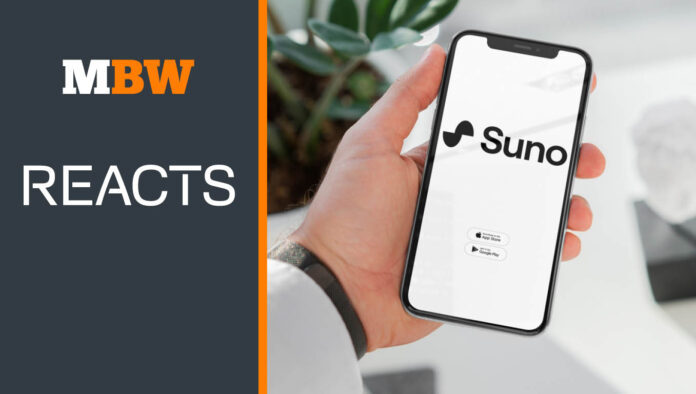MBW Reacts is a series of analytical commentaries from Music Business Worldwide written in response to major recent entertainment events or news stories. Only MBW+ subscribers have unlimited access to these articles. The below article originally appeared in Tim Ingham’s latest ‘Tim’s Take’ email, issued exclusively to MBW+ subscribers.
Is Suno x Spotify the industry’s AI endgame?
Let me paint you a picture.
It’s February 2026. The music industry’s AI wars, which seemed intractable just months ago, have resolved in a way nobody quite foresaw.
The announcement drops at 4pm GMT on a Tuesday: Spotify Acquires Suno’s Technology Assets for an Undisclosed Sum.
The lawsuits evaporate. The attorneys go to the pub. The music industry’s relationship with AI enters a new phase.
How might we get there? Snuggle down for story time.
Earlier this month, Spotify announced AI licensing pre-agreements with all three majors, plus leading indies Merlin and Believe.
No product was announced per se, but serious-sounding and universal (small ‘u’) promises were made over collaboratively developing “artist-first AI music products”.
These products, pledged Spotify, would be built upon “upfront agreements” with the music companies – not by “asking for forgiveness later”.
As a result, music’s AI chessboard is taking shape.
Suno sits with $125 million in VC funding, and a $500 million valuation, but mounting legal pressure.
That heat comes from the majors’ aggressive lawsuit against it, fuelled by what Sir Lucian Grainge recently called the “unauthorized (and, we believe, illegal) exploitation” of artists’ rights.
Udio, meanwhile, has been quietly building bridges. Sources suggest it’s closer to a licensing deal with the majors than Suno – but still some way off.
And Spotify? Spotify has just signaled it wants to be the Switzerland of gen-AI music – neutral ground where everyone can play, and everyone can profit.
Here’s how it could all unfold from here:
Suno’s investors start getting nervous. The legal bills are real, and unrelenting. In comparison to Udio, it may end up isolated, license-less, and in need of a friend.
(That’s doubly true if Suno – reportedly now looking to raise more money at a $2 billion valuation – cannot convince would-be VC backers that the majors’ expensive litigation will, eventually, go away.)
Meanwhile, Spotify faces its own pressures. Key competitor YouTube has already unleashed tools that let people remix short videos with AI.
SPOT just struck its own partnership with OpenAI – but, to some degree, one suspects it did so to stave off Sam Altman’s interest in music for a little while longer.
Conclusion: Daniel Ek‘s streaming giant needs to make a splash, and fast.
Yes, Spotify is vowing to build AI products that “create wholly new revenue streams for rightsholders, artists, and songwriters”.
But could a simpler solution reveal itself? Could Spotify end up offering Suno a lifeline?
Not a massive check, but enough cash to make Suno’s investors whole and, crucially, make the lawsuits go away.
Better than Suno’s VC backers watching that $125 million funding round get torched as kindling for expensive litigation.
This week, Sir Lucian Grainge stated UMG’s core principle around AI music: “We will NOT license any model that uses an artist’s voice or generates new songs which incorporate an artist’s existing songs without their consent.”
A Spotify-owned Suno, rebuilt with proper licensing, becomes the “responsible” alternative UMG has been seeking.
It could also immediately meet a different need for Spotify: additional subscription revenue streams/tiers outside of its core Premium offering.
Imagine:
-
Unlimited AI track generation
-
Remix tools for existing songs (properly licensed, naturally)
-
Collaborative features for human-AI composition
-
Early access to new AI models and capabilities
A music creation platform built into a music consumption platform.
What strikes me most is how familiar this all feels. The music industry has been here before – with radio, with MTV, with Napster, with Spotify itself: initial resistance, gradual acceptance, eventual embrace, and finally, transformation into the new normal.
But here’s the crucial difference: With Napster, the industry let technological disruption happen to it. With Spotify, it learned to contain the disruption.
Now with AI, the majors could perfect the playbook.
In 2008, Universal, Sony, Warner, and Merlin collectively took equity worth 18% of SPOT in exchange for crucial initial licenses – a stake that would be worth around $25 billion today.
In 2025/2026?
I wouldn’t be shocked to see those same majors, plus Spotify, end up with control of Suno. A platform that – as things stand – they all mutually see as a threat.
Music Business Worldwide



